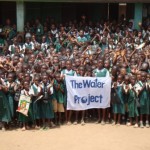This project was implemented by another partner, but is now monitored and maintained by The Water Project together with Mariatu's Hope.
When the Sierra Leone team arrived, community members were utilizing a protected hand dug well located two kilometers away from the community to meet all of their water needs. Because of this, families were suffering from cholera, dysentery, typhoid and malaria among other preventable water related illnesses. Community members also had access to a covered pit latrine that was insufficient to meet the community’s sanitary needs. The Sierra Leone team successfully constructed a composting toilet in the community to better fulfill the community’s sanitation needs. During the team’s stay, community members assisted the team with the water project whenever possible, provided any materials they had available, made food for the team, provided security over the water project during the night and prayed over the team daily. Most community members earn a living by gardening, fishing, teaching, petty trading, selling goods at local markets, working as doctors, in carpentry shops or working as drivers. There is a primary school located in the community with 1,041 students, all who now have access to a composting toilet to better meet their sanitation needs. Before leaving the area, the team provided community member, Hajia Kadiatu Kamara, with a contact number.
A Sierra Leone team member stated, "The hygiene training was really memorable because the people were so excited to tell the other people who didn't attend about what they learned. There were more than 100 people who attended the hygiene training each of the four days." During the hygiene education, the Sierra Leone team addressed: HIV/AIDS, Hand washing, how to properly transport and store water, disease transmission and prevention, how to maintain proper care of the pump, as well as signs and symptoms of dehydration and how to make Oral Rehydration Solution. All of these lessons are taught in a participatory method to help community members discover ways to improve their hygiene and sanitation choices, and implement community driven solutions. After the hygiene education, the community members gathered to construct a fence around the well site. This will help keep livestock and wild animals away from the community’s clean water source.
The Sierra Leone team had an opportunity to meet with thirteen year old community member and fifth grade student, Bangura Salamatu, who stated, "The newly constructed toilet is highly hygienic as compared to the old pit latrines. There is a hand washing station and we never had this before. We never had a place to wash our hands before. The old pit latrines were smelly."
 WAsH for Schools
WAsH for Schools Rehabilitation Project
Rehabilitation Project












